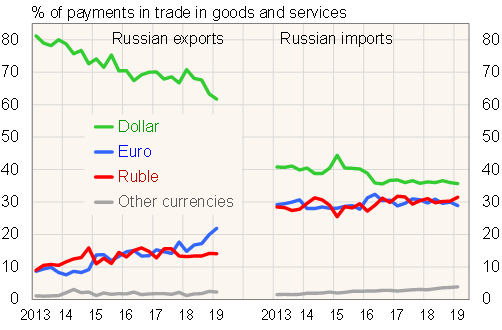BOFIT Weekly Review 31/2019
Russia tries to promote the ruble by easing the repatriation requirement for export earnings
The fresh law amendment applies to ruble-denominated export contracts, where the contracts also call for payment of export deals in rubles.
The repatriation requirement will be gradually phased out between the start of 2020 and start of 2024 for Russia’s principal exports (commodities such as crude oil, petroleum products, natural gas, coal, as well as waste and scrap metal). The repatriation requirement for other ruble-denominated export earnings will be dropped completely in one go from the start of 2020. The explanatory note to the law amendment says that due to the large amount of criminal activity associated with the export of raw timber and raw timber materials, the law maintains complete repatriation requirements for that branch.
Major currencies in Russian exports and imports, 2013–2019

Source: Central Bank of Russia.
All export earnings are currently subject to the repatriation requirement regardless of the currency used in the export contract. However, Russia long ago did away with the requirement of converting export earnings into rubles.
The purpose for eliminating the repatriation requirement is to encourage the use of the ruble in e.g. Russian exports where the share of the ruble has seen no gains in recent years. The euro’s share in Russian export contracts has doubled. Last winter, the euro’s share exceeded 20 %.